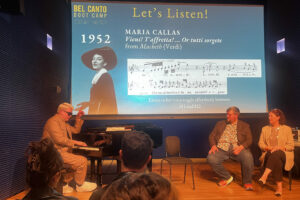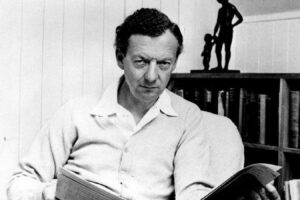

Henze is, for me, perhaps the most underrated, underperformed composer in recent memory. His catalogue of operas contains some masterworks – Der junge Lord, Boulevard Solitude, Elegy for Young Lovers, Pollicino, and Das verratene Meer just to name a few, all of which I’ve seen – but his symphonic works are equally thrilling.
Having missed New York City Opera’s production of Der junge Lord in the early 1970s, I became acquainted with Henze music when his third symphony was utilized as the score for Glen Tetley’s ballet Gemini when I attended its American premiere by American Ballet Theater in 1975 with Cynthia Gregory, Martine van Hamel, Jonas Kage, and Charles Ward. I immediately ran out and bought the Deutsche Grammophon collection of his (then) complete symphonies.
I twice attended performances of his full-evening ballet Orpheus with choreography by the up-and-coming, 29-year-old William Forsythe when performed by the Stuttgart Ballet in a nearly-empty Metropolitan Opera House in June 1979.
The first Henze opera I attended was Das verratene Meer at San Francisco Opera in 1991 (it was not broadcast, so my high-quality in-house recording will surface here one of these days).
Der Prinz von Homburg, completed in 1958 with a Hamburg premiere in 1960, is drawn from the 1811 play Prinz Friedrich von Homburg by Heinrich von Kleist. For the Prince’s dreamy demeanor, Henze was inspired by German and Austrian music from the past by composers such as Bach, Beethoven, and Mahler; the militaristic characters are characterized by 12-tone music influenced by Stravinsky and Schoenberg and other members of the Second Viennese School.
Nikolaus Lehnhoff’s 1992 production for the Bayerische Staatsoper, filmed and released on DVD, was sent to London and given by the ENO in 1996 in English translation.
The source for this week’s upload comes from Theater an der Wien, which presented a stunning production by Christof Loy in 2009 as a vehicle for Christian Gerhaher. Contemporary music specialist Marc Albrecht leads the Wiener Symphoniker in the Austrian premiere of Henze’s 1991 revision.
Owen Wingrave was Britten’s penultimate opera, conceived to fulfill a commission by the BBC for a television opera. Based on a Henry James short story, the opera was completed in 1970, filmed at Snape Maltings, and first broadcast in May 1971 in the UK. Benjamin Luxon took the title role in a cast which included John Shirley-Quirk, Janet Baker, Heather Harper, and, of course, Peter Pears.
I recall its American premiere on PBS shortly thereafter and was spellbound from the gamelan-influenced introduction and the haunting images of the interior of Paramore, the Wingrave family manse which is a character in itself.
More than with his earlier works, Britten experimented with the 12-tone serialist techniques and large tuned percussion sections which permeate his next and final opera, Death in Venice. About the work’s pacifist message, Britten labeled it his response to the Vietnam War.
A stage premiere at Covent Garden in 1973 was a failure and the opera lay neglected till the end of the century. After a 1997 Glyndebourne revival, the work, often performed with reduced orchestration, has been given in London, Chicago, Vienna (by the now-defunct Wiener Kammeroper), and in Frankfurt in 2010 in a production by Walter Sutcliffe, the source of this week’s performance.
Just as Henze conceived Prinz Friedrich Artur von Homburg for a lyric baritone, Owen Wingrave is performed by Michael Nagy, who shot to stardom as Wolfram von Eschenbach, one of the few saving graces of Bayreuth’s Tannhäuser from 2011 through 2013 (incidentally, Wolfram was the role of Christian Gerhaher’s Wiener Staatsoper debut in the premiere of Claus Guth’s2010 production). Owen’s sympathetic teacher, Spencer Coyle, is sung by Dietrich Volle, a brother of Michael Volle.
This also takes us closer to completing the operas of Britten: look for Gloriana, Albert Herring and the three Church Parables in the coming months.
Your alte Jungfer will, once again, kindly urge you to not be afraid of operas which contain atonal passages. Both scores are dazzling in their versatility and superb vocal writing.


























Comments